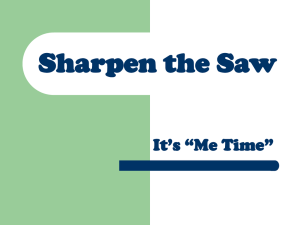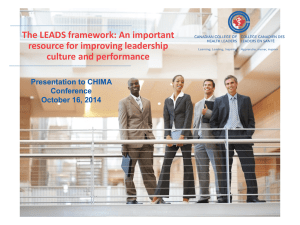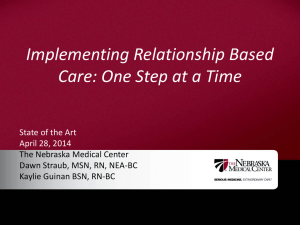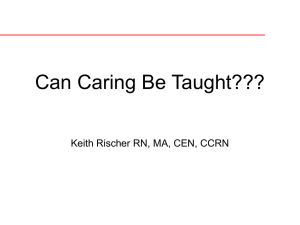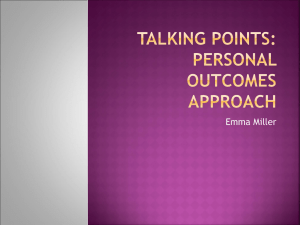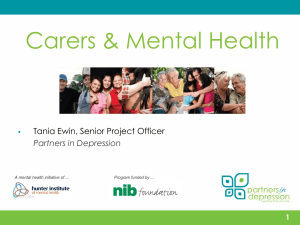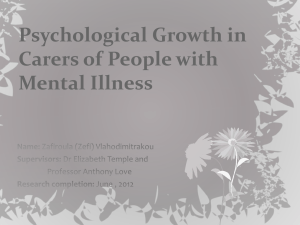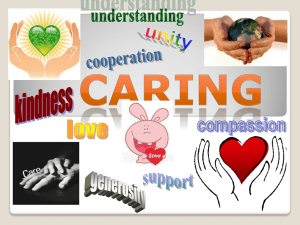Marilyn A. Ray PhD, RN, CTN-A
advertisement
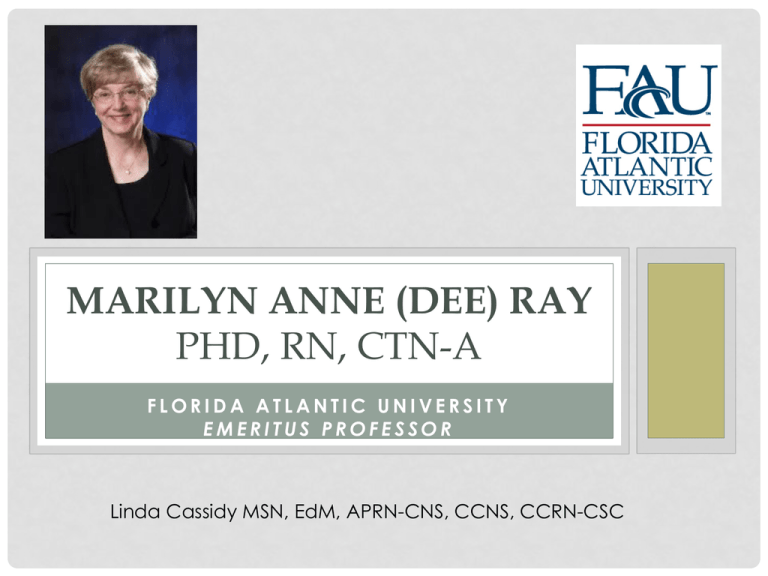
MARILYN ANNE (DEE) RAY PHD, RN, CTN-A FLORIDA ATLANTIC UNIVERSITY EMERITUS PROFESSOR Linda Cassidy MSN, EdM, APRN-CNS, CCNS, CCRN-CSC EARLY LIFE EXPERIENCE • Born in Hamilton, Ontario, Canada • Family of six children • Age 15, a nurse saved her father while hospitalized for a serious illness • Influenced decision to be a nurse EDUCATION – EXPERIENCE • Nursing Diploma (Registered Nurse), St. Joseph's Hospital School of Nursing Hamilton, Canada 1958 • University of California Medical Center, Los Angeles • • • • Obstetrics and gynecology Emergency department Cardiac and critical care (adults and children) Developed interest in diverse cultures • Bachelor of Science (BSN), Nursing, University of Colorado School of Nursing Denver, Colorado 1968 EDUCATION –EXPERIENCE • Master of Science (MS), Maternal/Child Nursing, University of Colorado School of Nursing Denver, Colorado 1969 • • • • Met Dr. Madeline Leininger (first nurse anthropologist) Developed interest in anthropology Studied children’s hospital as a small culture Clinical Practice – children and adults • Critical care • Renal dialysis • First teaching position: • University of California San Francisco • Dr. Barney Glaser and Dr. Anselm Strauss • Grounded Theory • Developed interest in qualitative research • 1971 – traveled to Mexico to study anthropology and health – field work in small villages (learned of life of aboriginal people) • 1972 – returned to Canada to be close to family • Occupational health • Neonatal Intensive care EDUCATION – EXPERIENCE • Master of Arts (MA), Cultural Anthropology, McMaster University Hamilton, Canada 1978 • Studied: • • • • human relationships decision making Conflict Hospital as an organizational culture • Doctor of Philosophy (PhD), Transcultural Nursing, University of Utah College of Nursing Salt Lake City, Utah, 1981 • First transcultural doctoral program in the US • Doctoral Dissertation “A Study of Caring Within An Institutional Culture” EDUCATION – EXPERIENCE • One of the co-founders of International Association for Human Caring (IAHC) 1978 • University of Colorado 1981 • Jean Watson • Developed interest in phenomenology • Dissertation Chair for Dr. Alice Davidson • Science of Complexity • Florida Atlantic University 1989 • Retired 2004 • Professor Emerita MILITARY SERVICE • Mid 1960s – US Citizen • Joined USAF Reserve, Nurse Corp • Graduated as flight nurse from School of Aerospace Medicine – Brooks Air Force Base, San Antonio, Tx • Aeromedical evacuation nurse – served in the Vietnam war...“our job was to bring the boys home” • Served in Air Force for over 30 years • 1990 – First nurse to go to Soviet Union with Aerospace Medical Association • 1991 – called to active duty during first Persian Gulf War • Retired as Colonial MAJOR INFLUENCES Scholars from many disciplines: • Nursing (Watson, Boykin, etc.) • Anthropology (Leininger and many in program) • Sociology (Glasser and Strauss) • Economics • Physics • Philosophy (Hegel, Husserl, Weber, etc.) James (Jim) Droesbeke - inspiration, friend, soul mate, and the love of her life. THE PHILOSOPHY OF HEGEL • Greatly influenced Ray’s Work • Hegel’s dialectic (way of reasoning) – “interrelationship between thesis, antithesis, and synthesis” • Thesis of being • Antithesis (opposite) non-being • Reconciled emerging (synthesis) into a unitive form of being • Ray’s theory • Implies that there is a dialectical relationship (thesis, antithesis, and synthesis)between: • Thesis of Caring: Human (person and nurse dimensions of spiritual – ethical caring • Antithesis of Caring: Organizational (bureaucracy) culture – technological, economic, political, legal, social • Synthesized into bureaucratic theory (process is a transformation and it continues to repeat itself – continually changing, emerging and transforming) RAY’S THEORY OF BUREAUCRATIC CARING • Originated as a grounded theory • Differential caring emerged as a substantive theory • Caring in organizations is complex • The meaning of caring is contextual – it varies depending on department and depending upon unit within nursing • Caring has different meanings depending on specific goals and values • Bureaucratic caring emerged as formal theory – represents the dynamic structure of caring within the complex organization • Dissertation Research (1981)involved the use of: • • • • Grounded theory methodology to generate theories Phenomenology to determining meaning of the experience Ethnography to study patterns in organizational culture Question – “What is the meaning of caring to you” RAY’S THEORIES Differential Caring Bureaucratic Caring • Caring varies by area or practice • Dynamic structure of caring within complex organization • Continually evolving and transforming • “The logical connectedness of caring to the cosmopolitan social order demonstrates that the Theory of Bureaucratic is unifying rather than alienating” (Ray, 2013) • Nurses in ICU value technological caring • Nurses in oncology value humanistic or spiritual caring • Nurses value caring in terms of relationship • Administrators value caring in terms of economics, legality, politics etc. A Study of Caring Within An Institutional Culture Marilyn Anne Ray 1981 Original Grounded Theory THEORY OF BUREAUCRATIC CARING 1989 COMPLEX ORGANIZATIONAL CULTURES RAY’S THEORY OF BUREAUCRATIC CARING Present Model: Holographic “interconnectedness of all things” SPIRITUAL –ETHICAL CARING • Holism and integration of body, mind, spirit • Spirituality of Caring • Creativity • Choice • Revealed in attachment, love, community • Ethics of Caring • Moral obligation to others • Not treating people as a means to an end but rather as people who have the capacity to make choices (Turkel, 2007) RAY’S ONGOING WORK • Requests from all over the world to use Bureaucratic Theory in professional practice models • Ongoing developing of Theory of Bureaucratic Caring • Complexity Science/Complexity Theory • Transcultural nursing • Technological caring • Continual enhancement of nursing scholarship • Mentorship of others MARILYN (DEE) RAY Caring and love are synonymous. Inquiring about caring touches the heart and translates through the soul, the "speaking together" between the one caring and the one cared for, the shifting of consciousness from a focus on "they" or "I" to a compassionate “we”. www.marilynray.com REFERENCES • Personal correspondence July 6, 2013 • Coffman, S. (2010). Theory of bureaucratic caring. In Alligood, M.A. & Tomey, A.M. (Eds.), Nursing theorists and their work, (pp. 113-134). Maryland Heights, Missouri: Mosby Elsevier. • Davidson, A.W., Ray, M.A. & Turkel, M.C. (2011). Nursing caring and complexity science. New York, NY.: Springer Publishing Company. • Ray, M.A. (2013). The theory of bureaucratic caring for nursing practice in organizational culture. In Smith, M.C., Turkel, M.C. & Wolf, A.R., Caring in nursing classics, (pp. 309-320). New York, N.Y.: Springer Publishing Co. REFERENCES • Ray, M.A. (2010/1981). A study of caring within an institutional culture. USA: LAP Lambert Academic Publishing. • Turkel, M.C. (2007). Dr. Marilyn Ray’s theory of bureaucratic caring. International Journal for Human Caring, 11, 57-69.
